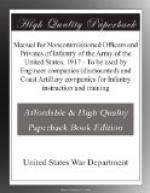202. The sentinel at the post of the guard will be notified by direction of the commanding officer of the presence in camp or garrison of persons entitled to the compliment. (Par. 224.)
203. The following examples illustrate the manner in which the sentinel at the post of the guard will turn out the guard upon the approach of persons or parties entitled to the compliment (pars. 224, 227, and 228), “Turn out the guard, commanding officer”; “Turn out the guard, governor of a Territory”; “Turn out the guard, national colors”; “Turn out the guard, armed party”; etc.
At the approach of the new guard at guard mounting the sentinel will call, “Turn out the guard, armed party.”
204. Should the person named by the sentinel not desire the guard formed, he will salute, whereupon the sentinel will call “Never mind the guard.”
205. After having culled “Turn out the guard,” the sentinel will never call “Never mind the guard,” on the approach of an armed party.
206. Though the guard be already formed he will not fail to call, “Turn out the guard,” as required in his special orders, except that the guard will not be turned out for any person while his senior is at or coming to the post of the guard.
207. The sentinels at the post of the guard will warn the commander of the approach of any armed body and of the presence in the vicinity of all suspicious or disorderly persons.
208. In case of fire or disorder in sight or hearing, the sentinel at the guardhouse will call the corporal of the guard and report the facts to him.
SECTION 11. COUNTERSIGNS AND PAROLES.
209. Seventy-seventharticle_of_war_.—Any person subject to military law who makes known the parole or countersign to any person not entitled to receive it according to the rules and discipline of war, or gives a parole or countersign different from that which he received, shall, if the offense be committed in time of war, suffer death or such other punishment as a court-martial may direct. (See par. 171.)
210. The COUNTERSIGN is a word given daily from the principal headquarters of a command to aid guards and sentinels in identifying persons who may be authorized to pass at night.
It is given to such persons as may be authorized to pass and repass sentinels’ posts during the night, and to officers, noncommissioned officers, and sentinels of the guard.
211. The PAROLE is a word used as a check on the countersign in order to obtain more accurate identification of persons. It is imparted only to those who are entitled to inspect guards and to commanders of guards.
The parole or countersign, or both, are sent sealed in the form of an order to those entitled to them.
212. When the commander of the guard demands the parole, he will advance and receive it as the corporal receives the countersign. (See par. 133.)




